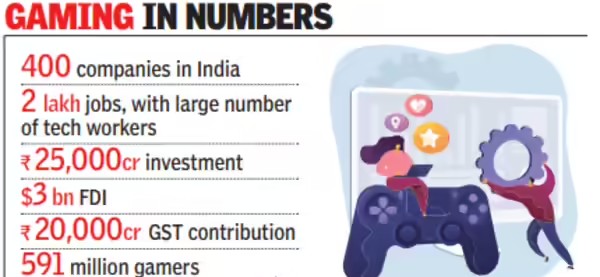India’s booming online gaming industry is staring down a legislative cliff as the Union Cabinet clears the Promotion and Regulation of Online Gaming Bill, 2025. The proposed law seeks to ban all forms of real-money gaming (RMG), including skill-based platforms, triggering widespread alarm across the sector. Industry leaders have called the move a death knell, warning of mass shutdowns, job losses, and a surge in unregulated offshore activity.
Here’s a comprehensive breakdown of the crisis unfolding:
1. What the Bill Proposes
- The draft legislation prohibits offering, aiding, abetting, or advertising any online game involving real-money stakes, regardless of whether the game is based on skill or chance
- It criminalizes financial transactions linked to RMG platforms, barring banks and payment gateways from processing deposits or withdrawals
- Penalties include up to three years of imprisonment and fines up to ₹1 crore for operators, and up to two years and ₹50 lakh for advertisers
- The Bill distinguishes RMG from eSports and social gaming, which will be promoted under a separate regulatory framework
2. Industry’s Reaction: Shock and Outcry
- Leading gaming companies including Dream11, MPL, Gameskraft, Zupee, WinZO, and Nazara Technologies have expressed deep concern over the lack of consultation prior to the Bill’s approval
- Executives warn that over 400 companies may be forced to shut down, risking 2 lakh jobs and ₹25,000 crore in foreign direct investment
- The sector contributes over ₹20,000 crore annually in GST and other taxes, which could evaporate if the ban is enacted
- Industry bodies such as the All India Gaming Federation (AIGF), E-Gaming Federation (EGF), and Federation of Indian Fantasy Sports (FIFS) have written to Home Minister Amit Shah seeking urgent intervention
3. Impact on Domestic Sports and Talent Pipelines
- Fantasy gaming platforms are major sponsors of non-IPL T20 leagues, state-level tournaments, and grassroots cricket initiatives
- A blanket ban could dry up funding for these leagues, weakening India’s sports talent pipeline and reducing visibility for emerging players
- Executives argue that fantasy sports are skill-based and regulated, and should not be equated with gambling or betting
4. Risk of Offshore Migration and Regulatory Vacuum
- Experts caution that banning regulated Indian platforms will push users toward offshore operators and illegal matka networks
- These platforms often lack consumer safeguards, KYC norms, and anti-money laundering protocols, increasing risks of fraud and exploitation
- Tax revenues will suffer as offshore entities operate outside India’s jurisdiction, creating enforcement challenges
5. A Call for Smart Regulation, Not Prohibition
- Industry leaders advocate for a licensing model similar to the UK, US, and Australia, where RMG platforms operate under strict rules
- Suggestions include deposit and loss limits, affordability checks, localized data storage, and aggressive blocking of illegal sites
- The 2023 framework, which allowed self-regulation and defined permissible games, is now at risk of being scrapped entirely
- Executives stress the need for a transition plan to protect user balances, employee rights, and investor interests
6. What’s Next
- The Bill is expected to be tabled in Parliament on August 20
- If passed, it could reshape India’s digital entertainment landscape, halting the growth of a sector projected to reach ₹9.2 billion in revenue by FY29
- Industry bodies continue to lobby for amendments, hoping for a regulatory compromise that preserves innovation, jobs, and consumer safety
Sources: Times of India, Moneycontrol, Business Standard, The Hindu, DNA India.







